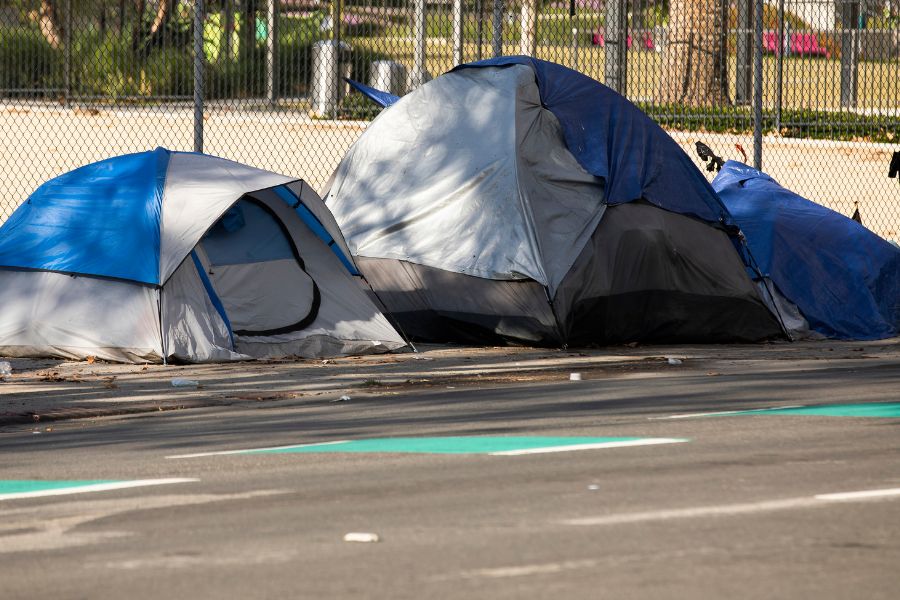CALL TO ACTION
Call and email Senators Collins and King, and Representatives Golden and Pingree as often as you can — every day — and implore them to demand that the Department of Housing and Urban Development (HUD) revise their disastrous changes to federal homelessness and housing policy.
If they do not, more than 1,200 Mainers – including people with disabilities, chronic illness, and families with children, all who have overcome homelessness – will no longer have a place to call home and will be forced back out on our streets.
WHAT IS HAPPENING TO HUD FUNDING?
We will soon see more tents and encampments popping up throughout Maine. In a continuation of massive cuts to programs helping people living in poverty, the current Administration has announced a huge change to how it will fund housing and homeless services. This new approach will decimate permanent supportive housing programs and will lead to — at a minimum — hundreds of people in Maine and over 170,000 people across the country returning to homelessness or experiencing unsheltered homelessness for the first time.
Together with the recent executive orders to arrest or institutionalize unhoused people, this new approach will lead to a human rights crisis for thousands of Americans and impact all our communities.
Federal funds for public housing assistance and programs for people experiencing homelessness come through the Department of Housing and Urban Development (HUD) grants. The changes announced:
- Reduce access to permanent housing at the exact moment that rent, evictions, and unsheltered homelessness are increasing.
- Undermine harm reduction, despite overwhelming evidence that low-barrier engagement is essential for housing stabilization.
- Reward policing and punitive responses, including encampment sweeps — strategies that consistently increase trauma and prolong homelessness.
- Elevate Transitional Housing, which is more expensive than current funded programs and has poorer long-term outcomes, particularly for Black, Latino, LGBTQ+, and disabled residents.
- Force programs to ignore best practices and proven solutions in favor of implementing treatment-first policies to receive essential funding.
If they do not, more than 1,200 Mainers – including people with disabilities, chronic illness, and families with children, all who have overcome homelessness – will no longer have a place to call home and will be forced back out on our streets.
WHAT DOES THIS MEAN FOR MAINE?
By abruptly slashing funding for existing permanent housing by two-thirds and redirecting critical resources to temporary programs with forced treatment and other ineffective mandates, 812 Maine households, or 1,200 individuals, are now at risk of losing their homes. These households are in towns and cities across the state – in both urban and rural areas.
Besides reducing the number of people staying in shelters, living in encampments, or on the street, permanent housing programs save the community millions of dollars each year. The cost to help a person stay housed pales in comparison to the cost of police calls, emergency room visits, medical transport, and jail stays they incur while homeless.
Please contact your U.S. Senators and Representatives TODAY to help keep your fellow Mainers housed!
“HUD’s decision to massively cut funding for proven solutions to homelessness, while at the same time the federal government is undermining SNAP benefits and healthcare, is exceptionally cruel. Make no mistake: HUD’s proposed changes will increase homelessness in our state. It will most certainly increase the number of people who are unsheltered and living outside on our streets, and it will increase the strains on our communities and emergency services like police and hospitals.” – Erin Kelly, Preble Street Senior Director of Social Work at today’s press conference on massive federal cuts to housing and homeless services funding


Federal government decimates funding to housing programs
As we shared earlier this month, there will soon be more tents and encampments popping up throughout Maine. In a continuation of massive cuts to programs helping people living in poverty, the current Administration has announced a huge change to how it will fund housing and homeless services. This new approach will decimate permanent supportive

Federal attacks on people in poverty
Instead of providing solutions to hunger, homelessness, and poverty, an onslaught of recent federal actions and policies are attacking the people suffering from these challenges. The massive cuts to food assistance (SNAP), Medicaid, and homeless prevention and housing programs are harming thousands of Mainers, including older adults, people with disabilities, Veterans, families, homeless youth and

5 things to know…about recent federal efforts to criminalize homelessness
If ensuring the basic human rights of people who are vulnerable and struggling in our community is important to you, right now is a critical time to speak up and out. In the last few weeks, the White House has issued a directive to forcibly remove people experiencing homelessness from Washington, D.C., and an executive
